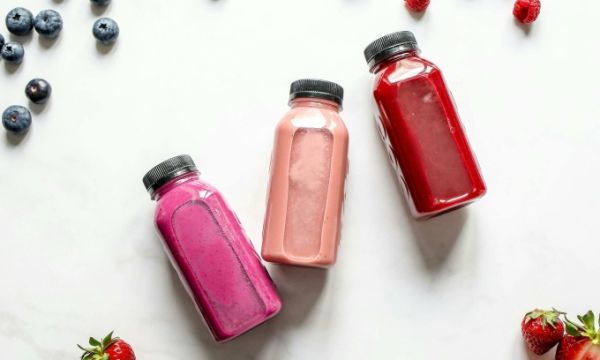
September 15, 2025 | 08:53 pm PT
“I often reuse plastic bottles to store drinking water or household condiments. People say this habit could be risky. Is that true?” (Han, 30, HCMC)
Answer:
Reusing PET plastic bottles for water, fish sauce, cooking oil, fruit juice, or herbal drinks remains common in many households because it is convenient and cost-effective. Neatly washed bottles lined up in the kitchen are a familiar sight.
|
Smoothies stored in plastic bottles. Illustration photo by Pexels |
PET bottles (plastic type 1, marked with a triangle and PET/PETE) are known for being lightweight, durable, transparent, and leak-proof. They are widely used for water, soft drinks, cosmetics, and pharmaceuticals—but they are designed for single use only.
Repeated use of PET bottles carries potential health risks:
- Bacterial buildup: Improper cleaning can lead to bacterial contamination, which may harm health.
- Chemical exposure: High temperatures above 70°C or prolonged sunlight can cause PET bottles to release chemicals such as phthalates and antimony into food or drinks. These substances can enter the body and pose long-term health risks.
Experts advise against reusing PET bottles multiple times, especially for hot liquids. If necessary, only cold liquids should be stored, and bottles must be thoroughly cleaned, completely dried, and used for a short period. For safe, long-term reuse, it is better to use containers made from HDPE (plastic type 2), PP (plastic type 5), stainless steel, or glass.
Dr. Bui Hoang Bich Uyen
Department of Nutrition, Xuyen A General Hospital, HCMC
-
Sportvot x FPJ: Mayo Football Tournament Delivers Thrilling Action

-
'Not Just A Gift, But An Inspiration': Rohit Sharma Gifts Bat To Ayush Mhatre In A Heartwarming Gesture; Check Pics

-
'Entire Pakistan Is Having Meltdown': BJP's Amit Malviya Slams Former Pak Cricketer Mohammad Yousuf For Calling India Captain Surya Kumar Yadav Pig

-
AFCAT 2 Result 2025 Declared At afcat.cdac.in; Direct Link Here

-
23-Year-Old Mexican Influencer Marian Izaguirre Dies 6 Days After Being Found In Critical Condition In Hotel Room
